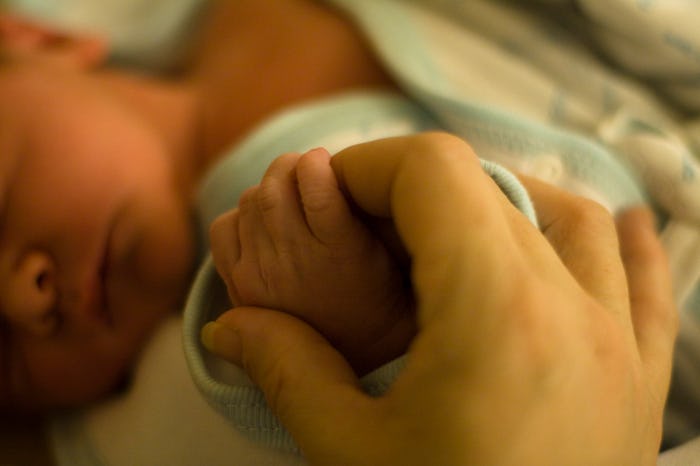Life
How To Help Moms Struggling With Infertility During National Infertility Awareness Week
The last week in April marks National Infertility Awareness Week, a campaign started by the infertility advocacy group Resolve in 1989. While awareness campaigns can often seem obsolete – yes, we're all aware of infertility – Resolve is taking steps to make the campaign more productive, and this year's theme, #StartAsking, offers concrete ways people can help other moms during National Infertility Awareness Week. #StartAsking aims to create a dialog around an issue that's often suffered in silence. While women suffering from infertility are encouraged to ask their employers for better insurance coverage and ask their partners to become more involved, there's something other moms can do to help: listen.
According to Slate, one in eight American couples experiences infertility, but most aren't talking about it. Your average person feels no shame about admitting to suffering from a cold, or a broken bone, but for whatever reason, some medical issues carry such a stigma that they're rarely discussed. And to be sure, some people grappling with infertility relish the chance to take a night off and just relax with friends after weeks, months, or even years of harrowing doctor's visits. But many would love to open up to their friends about their struggles, if only they knew that opening up was welcome.
So what does this mean for the average mom? No, I'm not suggesting that you start grilling your friends on why it's taking them so long to conceive. If someone has never brought up their ovaries with you, please leave it that way. But you might have a friend who does want to talk, but doesn't know how to bring it up. I'll stress again that I'm not advocating that anyone start pushing anyone to talk about something they consider private, so don't target anyone in particular, but it's never a bad thing to be more open. For those who have experienced infertility, bring it up! Out yourself as that one in eight. Talk about how it feels (or felt), how you handled it (or didn't), and let that other one – in sixteen now, I guess – know that they're not alone, and that infertility, like any other medical condition, is nothing to be ashamed of.
For those who haven't experienced infertility, that doesn't mean you have no role in the conversation. Share stories of people you know who went through it (with their blessing, of course). Talk about Chrissy Teigen and John Legend's infamous fertility issues, which have now come to a very happy conclusion, or about couples who went on to have fulfilling lives as adoptive parents or doting aunties and uncles. Talk about all of it, but above all, talk about it without judgment, because no two people experience infertility in quite the same way, and there's no perfect solution for anyone. Above all, make sure that your loved ones know that you're there for them, no matter what they're going through, and what they plan to do about it. They'll be glad to hear it.
But there's still more you can do. A donation to Resolve can help fund advocate training, legislation advancement, and the formation of support groups. And remember that for many families, infertility is treatable, but financially out of reach. Resolve has a comprehensive list of non-profit organizations that provide infertility treatment grants to families in need of financial assistance; all of which gladly accept donations.
Still not enough? If someone you know is experiencing fertility issues, and you happen to have the right ingredients, there's always surrogacy, egg donation, or sperm donation. It's a big step, to be sure, but it's the right one for many families. And if you struggled with fertility and now have leftover embryos, they're not necessarily doomed to sit in a deep-freeze until the end of time. In addition to paying annual storage fees, destroying the embryos, or donating them for medical research, you might also consider donating your embryos to another family who needs them. According to The National Embryo Donation Center, as many as 625,000 embryos are sitting around unused in the United States. That's hundreds of thousands of families that could potentially be completed, and all you'd have to do is sign a couple of forms. It's a pretty small sacrifice that could mean the world to someone.
